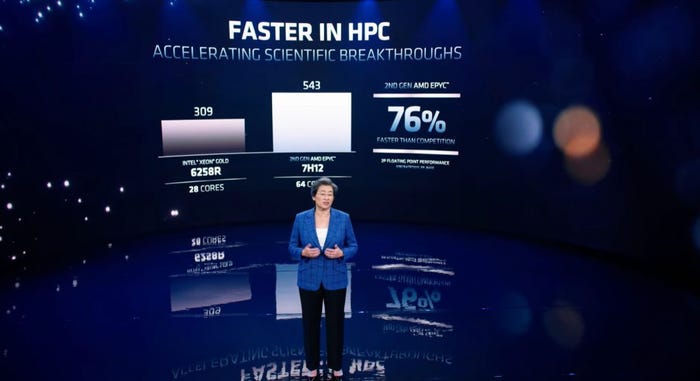AMD Further Challenges Intel with 3rd Gen EPYC CPU
AMD claims high-performance benchmarks over rival Intel and new VM security.
March 16, 2021

AMD claims a new ceiling in server compute performance and security with its 3rd Gen EPYC processors. The company began shipping them on Monday, describing them as the highest performing server processors available.
The AMD EPYC 7003 Series includes 19 different CPUs designed for enterprise data center, cloud and high-performance computing (HPC) workloads. At the top of the new line is AMD’s new EPYC 7763. It is available with up to 64 “Zen 3” cores per processor and 128 threads.
Designed for enterprise, cloud and high-performance computing (HPC) workloads, AMD said the EPYC 7003 line offers 19% more instructions per clock than its predecessor. It also introduces a new high-end of per-core cache memory, according to AMD.
Leading providers of servers and hyperconverged infrastructure for enterprise data centers and cloud services announced plans to integrate the new CPU. Among those identified by AMD include AWS, Cisco, Dell Technologies, Google Cloud, HPE, Lenovo, Microsoft, Oracle, Supermicro and Tencent Cloud.

AMD’s Lisa Su
“Our new EPYC processors extend our leadership in server CPUs — and not by a small amount,” said AMD CEO Lisa Su, during an hourlong digital launch event. “Third Gen EPYC is simply the best server processor available. We deliver more performance, best-in-class scalability and differentiated security that actually increases our lead and overall performance per socket, enabling maximum compute density.�”
AMD launched the first generation of its EPYC processors in 2017 but claimed leadership with EPYC Gen 2 in 2019. Su said the dual-socket versions of its second generation EPYC processors are 76% faster than Intel’s Cascade Lake Xeon processors. The AMD EPYC Gen 3 CPUs are 106% faster, Su said, based on Standard Performance Evaluation Corp. (SPEC) benchmarks.
“What that means for researchers is they can use EPYC processors to reduce the time needed to find the next scientific breakthrough, either by running more simulations in a given period of time, or using bigger data sets and more complex models,” Su said.
For cloud applications where integer performance is critical, the AMD EPYC Gen 3 processors are also 106% faster, according to Su.
“What that means for cloud providers is that they can take advantage of that additional performance to significantly increase their compute density and provide more performance per socket or rack than previously possible,” she said.
AMD has challenged Intel in the server and data center market before with mixed results. The comparisons to Intel’s Cascade Lake come as production of Ice Lake, Intel’s 3rd Gen Xeon Scalable Processors, ramp.
But the AMD EPYC line has given the company newfound credibility and has generated a wide partner ecosystem. AMD expects 400 cloud instances and 100 server platforms this year will run all generations of the EPYC processor line.
“They are going smack after the Intel market,” said industry analyst Ashish Nadkarni, IDC’s group VP for infrastructure systems, platforms and technology. “AMD is very targeted; they’re very focused on going after specific use cases.”
Secure Encrypted Virtualization
One key use case is data security with enhanced encryption. The new AMD 3rd Gen EPYC server CPUs offer improved security with Infinity Guard. It includes a new feature called Secure Encrypted Virtualization-Secure Nested Paging (SEV-SNP). AMD designed it to protect against attacks by establishing a sandboxed, isolated execution environment.
Microsoft is the first major cloud provider to introduce a service with AMD’s EPYC 7003 processors. Key to that is the new SEV-SNP capability, according to Microsoft Azure CTO Mark Russinovich.
“SEV-SNP enables protection of virtual machines by creating a trusted execution environment and has been substantially enhanced in the 3rd Gen AMD EPYC processor,” according to Russinovich. “These AMD EPYC-CPU-powered Azure VMs are fully encrypted at runtime, fulfilling the promise of confidential computing by protecting your data even when it is in use. The encryption keys used for VM encryption are generated – and safeguarded – by a dedicated secure processor on the EPYC CPU. This helps ensure that no one, even cloud administrators – and by extension the workloads, apps, or data in the VMs – have access to these encryption keys.”
Google Cloud deployed AMD’s Gen 2 EPYC processors to Google Compute Engine last year. Google Cloud plans to add AMD’s new CPUs. The EPYC Gen 3 CPUs will power a compute-optimized virtual machine for a service called C2D that Google will launch. It will enable larger VM sizes for high-performance workloads. Google Cloud will also extend its current general purpose compute service with the new CPUs.
The new AMD processors will also power Google Cloud’s confidential computing capability with its C2D and N2D compute offerings.
Read more about:
VARs/SIsAbout the Author(s)
You May Also Like


